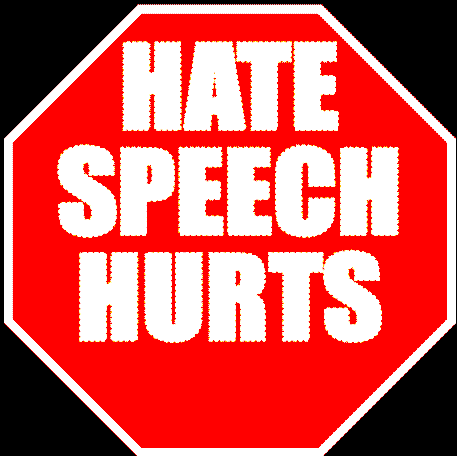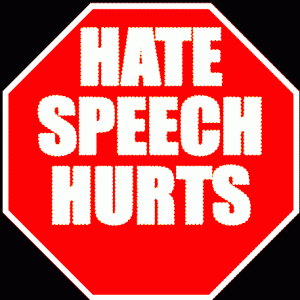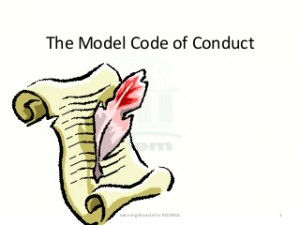In this blog post, Abhiraj Thakur, a student of NALSAR University of Law, Hyderabad writes about the current laws in place in India that aim at curbing the vicious act of giving hate speeches to garner votes. The post also looks into the various problems that arise due to the inefficient implementation of these laws.
What is a hate speech?
Hate speeches are often characterized by their potential effects – “speeches that promote fear, incite violence, articulate, identify as divisive, indoctrinate prejudice and promote discrimination”. There is no unanimously agreed upon meaning of hate speech at this point. The general thought of hate or abhor incites a ‘social sound judgment’ which in the long run transforms into the conviction of the majority of the general public and frequently shows itself in the form of such loathsome verbalizations. As a rule, this sets the establishment for the incitement of common savagery.
India has, from perpetuity, been a land of a multiplicity of religions, castes, cultures, languages and ethnicities. The communal background to India’s partition characterized by mass genocide and the ever increasing multiplicity of religious identities has turned India into a nation where religious passions can be easily ignited. Therefore, when a political leader unleashes communal hate speech, it often threatens to eradicate the democratic and plural fabric of the country. Despite the fact that the need to preclude and avoid hate speeches is certain, rivals of scorn discourse limitations frequently contend that the forbiddance of hate speech may ordinarily bring about an encroachment of flexibility of expression, which could adversely affect political mindfulness and expression, academic investigation and honest to goodness reactions; alongside a few aesthetic expressions. In a heterogeneous society such as India, even though anti-hate laws that are in place for regulation impose a certain amount of restriction on the fundamental right to freedom of speech and expression guaranteed under Article 19(1)(a) of the Constitution, the Apex Court of the country has time and again upheld their constitutionality on the grounds of being a reasonable restriction aimed at maintaining public order under Article 19(2).
Election Laws governing hate speech
-
The Representation of People Act, 1951 (RPA)
Elections in India are controlled under the Representation of People Act, 1951(RPA). To guarantee that men with high moral qualities are chosen as the delegates of the general population of India, the RPA has set out certain standards of profound constituent quality and restricted certain demonstrations which slander the immaculateness of the elections. In the domain of the constituent scorn discourse banter in India, the applicable procurements of the RPA are Sections 123(3), 123(3A) and 125. According to Section 123 (3), advance for the sake of religion, station, group or dialect is a degenerate practice. Further, advancement or endeavor to advance ill will and scorn amongst various gatherings of individuals is both a degenerate practice under Section 123(3A) and a discretionary offense under 125.
-
The Model Code of Conduct (MCC)
The RPA manages circumstances that emerge before the beginning of the elections and circumstances emerging after the announcement of the consequence of an election. The hate speech procurements under it are activated once decisions are over. The MCC or the Model Code of Conduct was created to manage such circumstances that emerge from the date of declaration of the timetable of election to the assertion of the outcome. The Election Commission of India, which is a protected body under Article 324 of the Constitution, has the force and obligation of the requirement of MCC. The MCC sets down wide rules in the matter of how the political gatherings and hopefuls ought to act amid a decision crusade. In the 1960’s, the political gatherings and also the EC achieved accord on the need and took after such rules so that free, reasonable and quiet decisions are directed to guarantee the dynamic working of the majority rule government in India. In the domain of the hate speech wrangle about, the MCC accepts guidelines such as Clauses (1) and (3) of Item 1 (General Conduct) of the MCC which denies gatherings and competitors from making any speech to familiar caste, religion or mutual affections for securing votes. Further, no gathering or hopeful can enjoy any action that may bother existing contracts or make shared hate or cause strain among various ranks, groups, religious or peaceful gatherings. In spite of such express procurements denying the utilization of incendiary dialect, equivocalness with regards to the enforceability of the MCC has frequently kept it from being a powerful obstruction against hate speech discourse.
Issues with RPA: Unwarranted liberal approach of Courts – the Hindutva judgments
Despite the fact that the RPA is an exhaustive Code inside which any rights guaranteed in connection with a decision or an elections debate can be found, the significance of legal elucidation can’t be reduced. Legal elucidation in India in instances of discretionary scorn discourse has been a horrid illicit relationship, and the legal thought process in India has encouraged this as opposed to controlling the development of degenerate practices, for example, loathe discourse. The melancholy side of such legal understanding, particularly in connection to Sections 123(3) and 123(3A) of the RPA, went to the fore in Ramesh Yashwant Prabhu v. P.R. Kunte.[1] This case included charges of degenerate practices against Prabhu, the then leader of Bombay and his “specialist” Bal Thackeray. They made deprecatory references to Muslims and further announced a war against the Muslims. The Supreme Court, however, presumed that the addresses made were infringing upon Section 123(3A), it exhibited a more liberal approach towards a portion of the germane issues. The court observed that a simple reference to any religion in a decision discourse does not bring it into the domain of Section 123(3) or 123(3A), since reference can be made to any religion with regards to secularism or to condemn any political gathering for victimizing any religious gathering or by and large for safeguarding of the Indian society. The court further included that the specific “use made of these words and the importance looked to be passed on in the discourse additionally must be seen.” Through such a judgment, the court gave a free hand to the political gatherings to act on their divisive governmental agendas under the clothing of secularism.
In yet another case of Manohar Joshi v. Nitin Bhaurao Patil,[2] Joshi had expressed in a discretionary discourse that “the principal Hindu state will be built up in Maharashtra”. Nonetheless, the court did not hold Joshi blameworthy for infringement of Sections 123(3) or 123(3A) of the RPA as in the court’s perspective, such an announcement was not a speech for votes on the premise of religion, however basically “the expression, best case scenario, of such a trust”. The previously stated judgments have frequently been utilized as a shield by political gatherings as an excuse to get away illiberal exercises, the act of scorn discourse being the most manhandled type of such exercises. Despite the fact that change is accessible through a decision appeal under the watchful eye of a High Court, the authorization of these procurements has been weakened extensively by the 1996 decision of the Supreme Court in the Manohar Joshi case.
Problems with MCC: Lack of statutory status
For the initial four decades of its presence, the recognition of the MCC was to a great extent left to the great feeling of the political gatherings. It remained an uninvolved record giving general rules. The MCC was planned to be taken after intentionally by political gatherings to keep up elections crusade on sound lines to guarantee peace during the election period. For whatever length of time that the Code stayed on paper and was not entirely upheld, there was no resistance. Be that as it may, when the EC energetically declared its intention to implement the MCC by taking stringent activities such as reprimanding the contender to scratching off by-elections for infringement of MCC procurements, it was met with firm resistance and frequently, the legitimacy of the MCC and the authenticity of the moves made under it were questioned. Since MCC does not have a statutory status, no legitimate outcomes can take after from the rupture of its procurements.
Reforms needed
We see numerous instances of breach of MCC in elections at all levels in our country, but the lack of statutory status of MCC reduces even a constitutional body like Election Commission to the condition of a hapless onlooker of the conspicuous infringement of the rationality and soul of the model code. It, along these lines, plays the key role in providing administrative support to the MCC to guarantee a strict usage of its procurements which will help in checking discretionary contempt discourse adequately and instantly. Additionally, a wide and upgraded translation of the nature and extent of forces of Election Commission is required. Article 324 of the Constitution provides that the superintendence, bearing and control of the behaviour of decisions to Parliament are vested in the EC. The expressions “superintendence, course and control” are of wide adequacy and must be deciphered to incorporate all forces important for the smooth and compelling behaviour of elections. In this manner, under Article 324, the EC can practice any force which is important to accomplish the goal of free and reasonable decisions, regardless of the fact that the Conduct of Election Rules, 1961 don’t particularly define such powers.
Thus, it is evident that there exist problems with the current electoral laws in our country which hamper their objective of regulation of hate speeches which in turn is a failure of the entire democratic process. A free and fair election forms the core of a democracy and for the largest democracy in the world it is definitely a matter of concern. Our Election Commission is unequivocally the most efficient in the world and it has time and again proved its worth by successfully conducting numerous elections in different states and for the entire country as well. However, at the same time we find there are a few loopholes to be plugged, especially when it comes to regulation of hate speeches during elections. This malpractice needs to be curbed at the earliest so as to transform our country from being a procedural democracy to also a substantive one.
Footnotes:
[1]Available At: https://www.google.co.in/url?sa=t&rct=j&q=&esrc=s&source=web&cd=1&cad=rja&uact=8&ved=0ahUKEwj14OiR5pzNAhXCG6YKHcAXBqAQFggdMAA&url=http%3A%2F%2Fsupremecourtofindia.nic.in%2FFileServer%2F2015-03-24_1427183283.pdf&usg=AFQjCNEXLt6cUiK_FVD2Dik6D_HwYpDq1A
[2] 1996 AIR 796, 1996 SCC (1) 169
 Serato DJ Crack 2025Serato DJ PRO Crack
Serato DJ Crack 2025Serato DJ PRO Crack














 Allow notifications
Allow notifications


